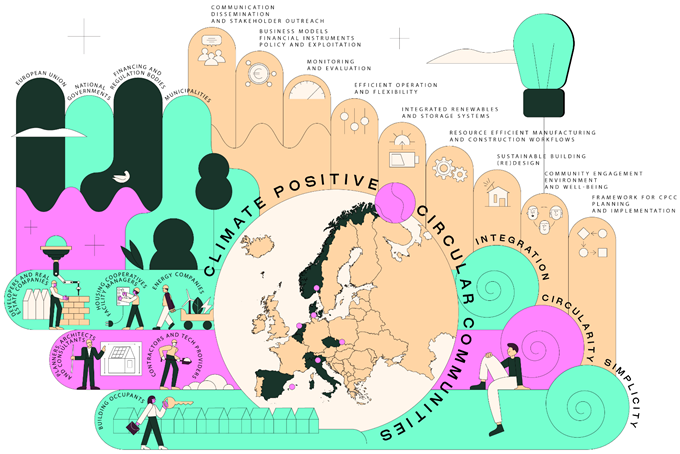The ARV project has received 20M euros in funding from the EUs Green Deal call to research climate positive circular communities in Europe.
The project will provide guidelines and a political framework for future energy-efficient and circular solutions in the construction industry. 35 partners from seven European countries are involved. Establishing six climate-positive areas around Europe is at the project’s core and the Grant Agreement has now been signed with the EU Commission.
The name ARV comes from Norwegian and means “heritage” or “legacy”. It reflects the emphasis on circularity, a key aspect in reaching the project’s main goal of boosting the building renovation rate in Europe.
Urgent call for renovation of buildings
“We must increase the pace of renovation of our existing buildings if we are to achieve the climate goals, and we must think circularly” says Inger Andresen, project coordinator and professor at the Department of Architecture and Technology (IAT), NTNU.
ARV is led by the Norwegian University of Science and Technology (NTNU) and was awarded the grant in fierce competition with 115 other applicants for the EU's Green Deal call.
“Construction accounts for as much as 40% of the EU's total energy consumption and 36% of greenhouse gas emissions. Renovating existing buildings and building a more efficient infrastructure around energy utilization has major environmental benefits” emphasizes Inger Andresen.
Builds on existing research on zero emission buildings and neighbourhoods
The project relies heavily on research on zero emission buildings and neighbourhoods driven by the Research Centre on Zero Emission Neighborhoods (The ZEN Research Centre), a Centre for Environment-friendly Energy Research (FME) in Norway. The ZEN Research Centre is hosted by NTNU and lead by NTNU and SINTEF in collaboration.
“The fact that we are winning such a large project shows that long-term and systematic investment is useful. We are now looking forward to taking this knowledge to Europe and contributing to the EU's important initiatives Green Deal and Renovation Wave. Together with our partners in ARV, we will develop solutions for attractive, robust and affordable homes and buildings - which are also sustainable” says Head of the ZEN Research Centre, Arild Gustavsen.

Figure 1: The concept of ARV with the 6 demonstration projects of Climate Positive Circular Communities riding on the renovation wave (3 waves containing the pillars of integration, circularity, and simplicity) supported by the different stakeholders working together to make innovations in 9 thematic focus areas.
Six demonstration projects in six European cities
The core of the ARV project lies in the six large-scale demo projects in six European cities (Oslo in Norway, Sønderborg in Denmark, Karvina in the Czech Republic, Utrecht in the Netherlands, Palma in Spain and Trento in Italy). These will be developed as Climate Positive Circular Communities, which is a concept that rests on three main pillars:
- circular economy
- integration of people, buildings and energy systems
- simplicity – achieved by means of digitalization and industrialization.
“The ARV concept highlights an integrated circular design that cultivates the aesthetics and improves amenities for the buildings in line with the new European Bauhaus strategy” says Niki Gaitani from NTNU, who will lead the work on sustainable design of the demo projects. The 35 partners in ARV represent the entire value chain in the building and energy sector.
The project is funded by the Green Deal initiative and falls under EUs framework programme Horizon 2020. It will start January 2022 with a duration of 4 years.
The 35 partners in the ARV project:
Norwegian University of Science and Technology (NO), Architects Council of Europe (BE), Czech Technical University (CZ), Technical University of Denmark (DK), Danfoss AS (DK), ENFOR AS (DK), Project Zero (DK), EURAC Research (IT), SINTEF (NO), Palma City Council (ES), IBAVI (ES), Catalonia Institute for Energy Research (ES), METROVACESA (ES), University of Applied Sciences Utrecht (ES), Housing Europe (BE), Buro de Haan (NL), Center Denmark/EU Digital Innovation Hub (DK), Sønderborg Andelsboligforening (DK), Green Digital Finance Alliance (CH), Stichting Bo-Ex ’91 (NL), RC Panels (NL), Utrecht University (NL), Municipality of Utrecht (NL), Bos Installatiewerken B.V. (NL), iWELL (NL), MEX Architects B.V. (NL), Mitros (NL), Municipality of Karvina (CZ), Dolomiti Energia (IT), Habitech (IT), University of Trento (IT), Politecnico Torino (IT), Oslobygg KF (NO), NanoPower (CZ), AIGUASOL (ES)





 A unique international forum for public research organisations and companies to connect their external engagement with strategic interests around their R&D system.
A unique international forum for public research organisations and companies to connect their external engagement with strategic interests around their R&D system.